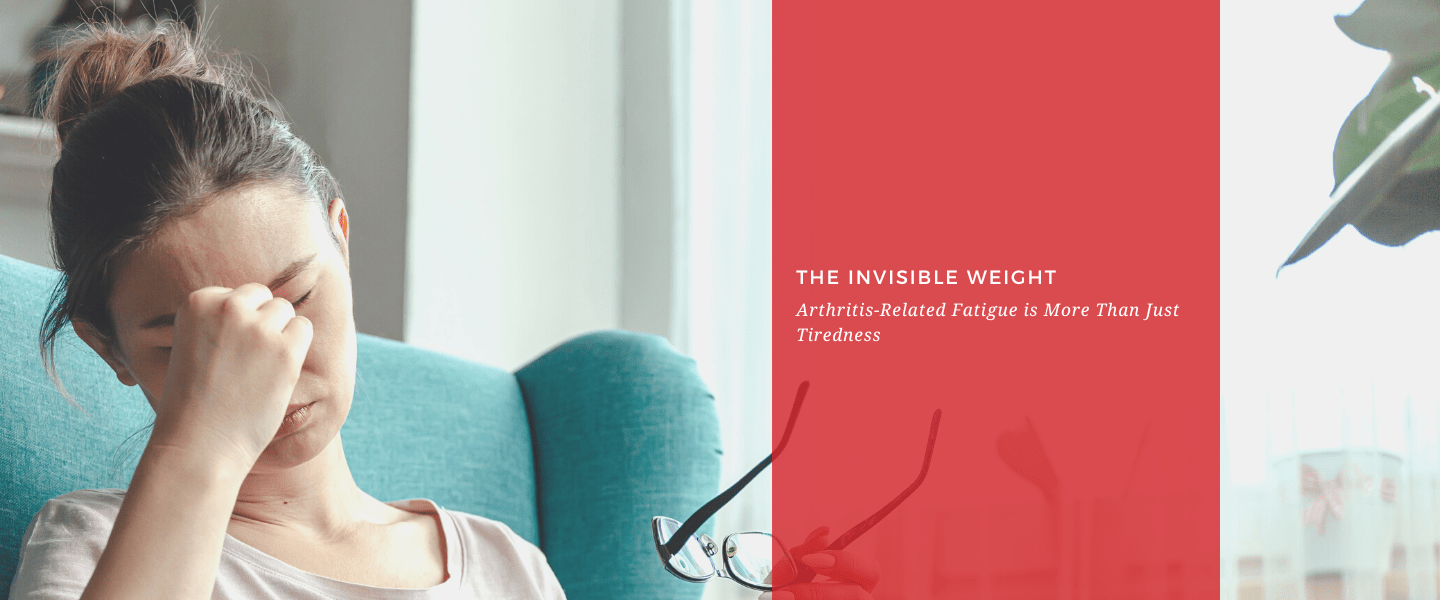With over 1 million orders

The Invisible Weight: Arthritis-Related Fatigue is More Than Just Tiredness
In this post, we put the spotlight on a lesser-known, but significant symptom of arthritis: fatigue. The piece provides insight into the nature of arthritis-related fatigue, how it intertwines with arthritis symptoms like joint pain and inflammation, and offers guidance on strategies to manage this often-overlooked aspect of the condition.
A stiff knee, an aching shoulder, the characteristic swelling in your fingers - these are the hallmark signs of arthritis we're familiar with. But beneath the visible distress of inflamed joints is a silent, but decidedly more insidious symptom: fatigue.
When we say 'fatigue', we're not talking about the garden-variety tiredness that hits after a long day or a restless night. Arthritis-related fatigue is a different beast entirely—an overwhelming, relentless sense of exhaustion that no amount of sleep or rest can remedy.

Imagine waking up after a full night's sleep and feeling as if you've just run a marathon. Or trying to push through a fog of exhaustion so thick that prevents you from completing the simplest task. This is the daily reality for countless individuals battling arthritis.
Explaining Arthritis-Related Fatigue
So, what makes arthritis-related fatigue so different?
The answer lies in the very nature of arthritis itself. Chronic inflammation, the engine that drives arthritis, is a greedy beast. It guzzles so much energy that it leaves little for anything else.

Not only is arthritis-related fatigue an unmistakable symptom, but it's also a remarkably common one. The Arthritis Foundation paints a stark picture - a staggering 98% of people with arthritis experience fatigue, and nearly half of these consider their fatigue to be severe.
A study published in the journal 'Rheumatology' added another layer to this unsettling picture. It found that fatigue levels in rheumatoid arthritis patients were higher than those in individuals with other chronic conditions. And in a survey by the National Rheumatoid Arthritis Society in the UK, over 89% of respondents said fatigue significantly impacted their lives, with more than half stating it was more debilitating than pain.
Managing Arthritis-Related Fatigue
Arthritis-related fatigue, as the data suggests, is not mere tiredness. It's a pervasive, often debilitating symptom that demands its own spotlight in arthritis management.
Managing fatigue when you have arthritis involves an intricate balance of lifestyle adjustments, tailored medication regimens, and psychological support. Physical activity, diet, and sleep hygiene—all combine to help prepare your body to deal with the symptoms of arthritis. Cognitive-behavioral therapy, mindfulness, and stress management techniques are equally valuable methods that have been known to help patients navigate the mental minefield of chronic fatigue.
Think of it like you’re training for a marathon—it’s a task that requires sustained effort, individualized strategies, and most importantly, a deep understanding of the distinct challenge at hand.
To that end, it means taking a more meaningful look at your daily routine to see what can be modified, changed, or sustained. Keep the following in mind:
- Counterintuitive as it may seem, incorporating regular, low-impact exercise into one's lifestyle can stave off fatigue. Gentle activities such as swimming, cycling, or yoga can recharge energy levels, improve sleep, and lift mood.
- Next, take a more discerning look at your eating habits. Food, after all, is our primary source of energy. A balanced diet that emphasizes fruits, vegetables, lean proteins, and healthy fats can provide sustained energy and potentially temper inflammation.
- Sleep hygiene also warrants attention. As the National Sleep Foundation suggests, a consistent sleep schedule and restful environment can work wonders. It's also important to address sleep disorders, which, perhaps unsurprisingly, are more common in people with arthritis.
- The mental and emotional toll of chronic fatigue is no less significant. Techniques like cognitive-behavioral therapy (CBT), mindfulness, and stress management can offer valuable tools to help individuals navigate this often-overlooked aspect of arthritis.
- Finally, a review of medication is crucial. Certain drugs used to manage arthritis can contribute to fatigue. Regular discussions with healthcare providers about medication side effects and potential adjustments can make a meaningful difference.

Arthritis-related fatigue isn't just an 'add-on' symptom; it's a complex, pervasive condition that can significantly impact your quality of life. Its “invisible” nature makes it easy to overlook, to dismiss as 'just tiredness'. But it's more than that, and it's high time we recognized it as such.
Arthritis and Fatigue--The Real Deal
By understanding the distinct nature of arthritis-related fatigue, we can start to shift the narrative and cast a spotlight on this invisible symptom. In doing so, we can hopefully pave a path towards better management and improved quality of life for those living with arthritis.
